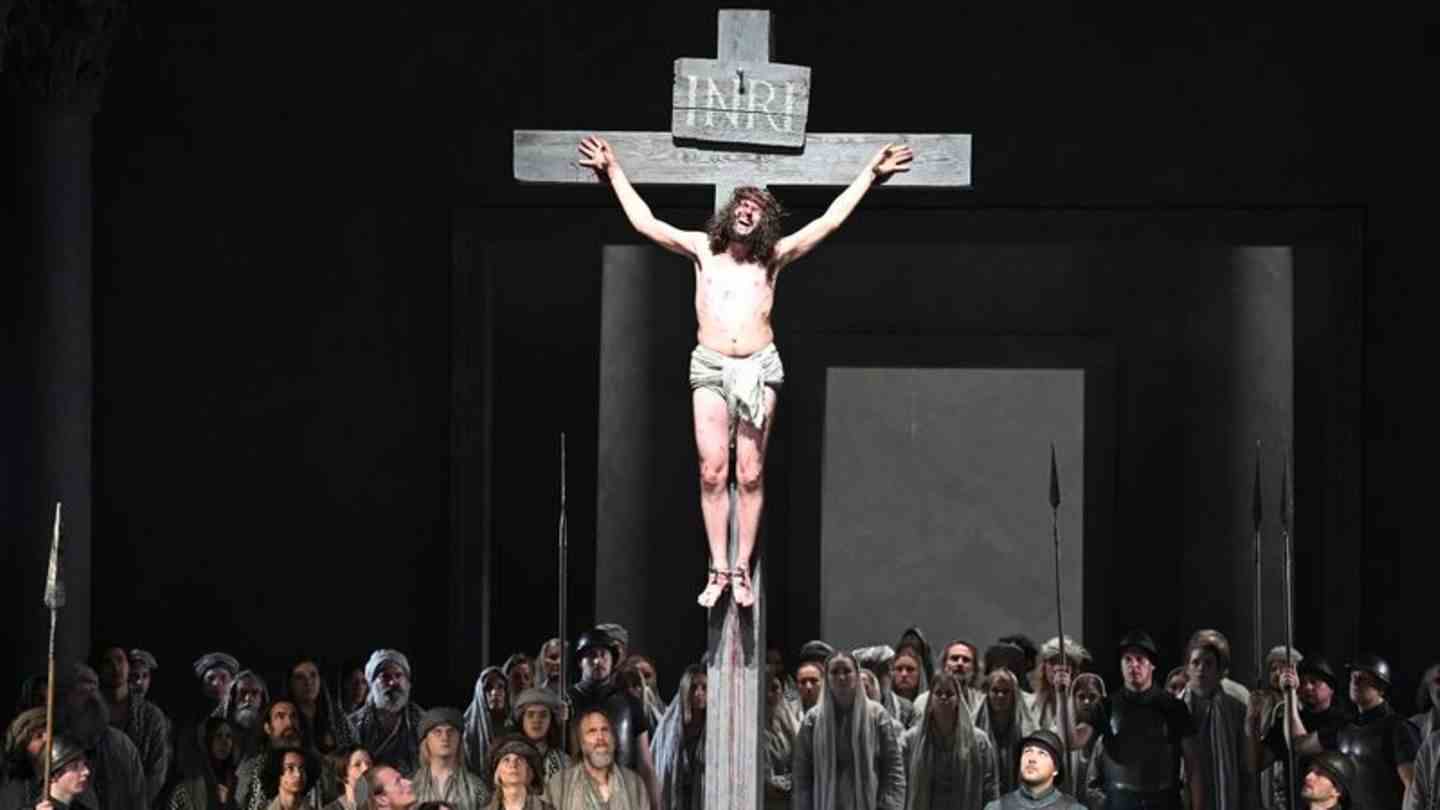passion plays
Passion premiere with pugnacious Jesus
More than just a story of good and evil: The 42nd Passion Play has red-hot themes. Photo: Angelika Warmuth/dpa
© dpa-infocom GmbH
Opulent images, powerful orchestral music: after more than a decade, Oberammergau is once again the scene of its famous Passion Play. The Jesus in the alpine village has red-hot messages.
Times are not rosy. In front of a dark-grey backdrop, Jesus warns people to turn back, sometimes loudly and energetically, sometimes despairing of this world.
With a bloody crucifixion, a passionate message and many references to Judaism, director Christian Stückl brings the story of the suffering and death of Jesus in Oberammergau to the stage. Around 4,400 invited guests saw the premiere of the famous Passion Play in the alpine village on Saturday.
“Keep the Peace”
“Keep the peace,” Jesus urges Judas at the Last Supper, when the frustrated resistance to the oppressing Romans demands: “God wants us to resist.” The 2,000-year-old Bible verses that Frederik Mayet calls out to the disciples and people as a strong Christ become burningly topical in times of war: “Blessed are they who make peace.” And when arrested, when Peter wants to defend him: “Those who take the sword will perish by the sword.” Again and again he warns: “Turn around”, “think around!”.
Stückl is Catholic, but once again goes his own way with a critical distance from the church. For example, after the resurrection, he no longer allows Jesus to appear in person on the stage.
Spectacular crowd scenes
Spectacular are the crowd scenes, such as the condemnation of Jesus, a hallmark of the Passion. Hundreds of people crowd the stage, loudly demanding “Crucify him!”. Around 2,100 locals take part in the almost 400-year-old game, almost half the town, the oldest over 90, the youngest in the arms of their parents. Refugee children are also there. In addition, horses, camels, sheep, goats, chickens and pigeons flutter through the open theater roof. Stückl, master of large scenes, plays with chaos and creates order at the same time.
In 1633 the people of Oberammergau took a vow to avert the plague. Since then, every ten years, the Upper Bavarian alpine village has staged the monumental “play of the suffering, death and resurrection of our Lord Jesus Christ”, an impressive performance by amateur actors, musicians and soloists. This time Corona delayed everything by two years.
Jesus raises his voice against war and violence
The Oberammergau Jesus clearly raises his voice against war, violence, expulsion and discrimination. In doing so, he invites a controversy. Even if the discourses sometimes drag on, there are fervent discussions with and about Jesus – just as many would like the Church to do.
Stückl creates more space for the women than the template from the Bible provides as a basis. He introduces Pilate’s wife and strengthens the roles of Mary, Mary Magdalene and Veronica. Andrea Hecht plays Maria as a worried mother struggling to let her son live his own life.
It is Stückl’s fourth production. Since 1990 he has consistently rid the play of anti-Judaist passages. Like the disciples, Jesus wears a kippah and is obviously a devout Jew. When the bread is broken, he recites the blessing in Hebrew and sings the “Shema Israel”, one of the most important prayers of the Jews. And on the cross he calls to his father: «Eloi, eloi, lama Sabachtani (my God, my God, why have you forsaken me)». This sends a strong signal in the face of ever new anti-Semitic excesses.
Reinterpreted Judas with a sense of justice
At Stückl there is no simple good and bad. It shows a complex conflict within the Jews under the brutal rule of the Romans, which is gaining momentum in view of the Ukraine, but also other hotspots.
Even the disciples are by no means always of his opinion. Jesus enters the discourse with a newly interpreted Judas in particular. Young talent Cengiz Görür shows this Judas with a strong sense of justice, who is not just a greedy, evil traitor. For the first time, with Görür and Abdullah Karaca, Stückl gave leading roles to two Oberammergau residents of Muslim faith.
The whole play takes place in a temple complex (Stefan Hageneier stage) as the religious and political center of Jerusalem: the opulent living images with key scenes from the Old Testament set a counterpoint to the otherwise sparse stage design. They are inserted like Jesus’ reminder of the writings of his ancestors: the expulsion from paradise, the golden calf, the burning bush. Choir and orchestra conducted by Markus Zwink accompany the scenes with some outstanding voices.
The small village lives these games with passion – and inspires guests from all over the world. Several hundred thousand visitors are expected to attend over 100 performances, many from abroad.

